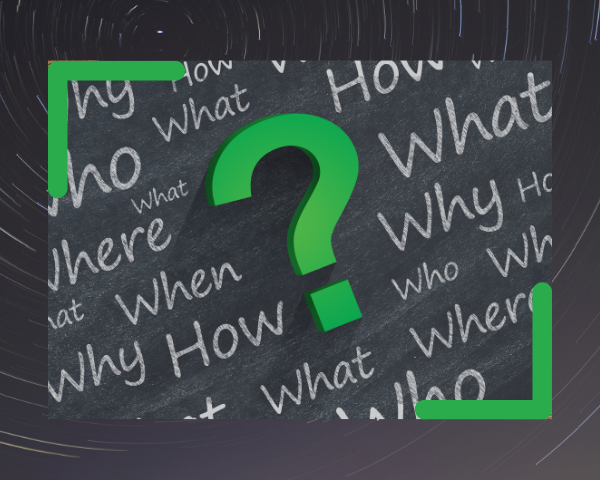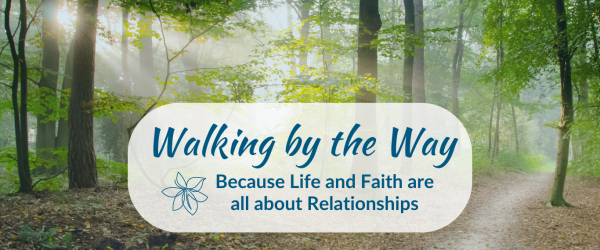What’s my problem with “Why”?
No doubt, the number of my “why” questions defied calculation. But why stop to count, I was too busy asking those annoying “why” questions. That penchant started before the typical season of the toddler’s “why” years and trickled into my adult conversations. I learned the hard way that “why” questions spark contention, not amicable discussions.
To my defense, I was born curious about life on planet Earth. As a truly inquisitive knowledge seeker, I hoped that my good intentions would shine through each “why” question. Purposely being obnoxious or sparking contention was never on my agenda. But if you threw a dogmatic statement my way, my hand would be the first raised to ask a (hopefully) appropriate “why.” As a teenager, I am positive that my parents were completely disenchanted with my rule and boundary-pushing “Why?” questions. In high school English class, “Why” was my favorite of the “5W and 1H” words in the journalist’s tool bag of interrogative words: who, what, when, where, why, and how.

The journalist toolbag of “5W and 1H” words
So, I grew up convinced that a reasonable “why” must be hiding behind all things illogical or perplexing to my mind. Shouldn’t we validate why things are the way they are? How else could one discover if they really had to be that exact way? Armed with the sincerely held belief that my “why” questions could get straight to the bottom of each dilemma, I was alert and ready for the challenge. I admit, I consumed endless breaths, fulfilling my assumed duty.
It took more than half a lifetime to learn that I was wrong, so wrong.
Here is the story of how I went wrong with “why.”
I often joked that “why” was probably my first baby word. My mother claimed that I came from the womb asking, “Why?” As a toddler, I excelled at asking “why.” But you expect that from a toddler as they touch, taste, test, and explore everything in their reach and out of their reach.
Toddlers have limited vocabulary and language skills to approach a physical and relational environment that dwarfs their little beings. “Why?” Three letters combined into one easy-to-speak syllable fit well in their research tool bag. Their brains work overtime to accumulate, assimilate, and synthesize the data points of their day into comprehensible sequences of events and human interaction.
Putting their best “why?” forward, they approach their world with unjaded enthusiasm. If given a home environment that encourages curiosity and learning, a toddler’s “why” questions reward him/her with face-to-face conversational time that provides a multi-sensorial learning experience. Later, they will figure out that “why” questions can divert or delay compliance with directions.

“send ’em abroad…one million Hows,
two million Wheres,
and seven million Whys!”
Rudyard Kipling’s adorable poem, “The Elephant’s Child,” captured it beautifully! (See the full poem at the end.)
But adult “why” questions lack the toddler’s charm.
We need better exploratory questions for our adult relational tool kit. If you typically ask “why” questions, reconsider if they are serving you well. How far did “why” get you the last time you confronted your misbehaving child with a “why” question? Why did you hit your sister? Why did you paint the cat’s tail blue? Why…?! Did they freeze and mumble, “I don’t know,” uncertain how to respond? Consider a similar scenario between a boss questioning an employee about their work (and imagine that you are the employee). Did “why” help you answer calmly?
Honestly, it is hard to shake the belief that “why” will get you straight to the bottom of things. Just try deleting “why” from your routine question-asking profile. You will quickly see how much you over-rely on it. But sometimes, we still can’t resist going for the “why!”
Unfortunately, as I got older, the “why” word found its way into my relational skills tool bag as well.
Here is my working theory:
“Why” questions are a once useful habit (from our early childhood world). They arise naturally and purposefully. As adults, however, that usefulness has worn off and can rub people the wrong way, provoke contention, block communication, and diminish relationships.
Taking the “Why” posture adds a confrontational context to our relationships as well as our communication. The direct “Why” question and posture are not structured to gain the knowledge or understanding that we desire. They don’t foster relationship-building or restoration. Suppose, however, that we soften our tone and temper our direct “why” question with an indirect “I was wondering why…” statement. The ‘why’ word embedded in the indirect version still functions as a challenge, just not as harshly.
What makes “why” so confrontational?
Look at the two words that tag-team following it: “Why did you….?” More importantly, that question often appears in the context of an offense or a disagreement. “Why” gets linked to a tone that is accusatory instead of gentle. It demands accountability.
Is there more to the “why” issue than just, “inquiring minds want to know”?
Yes, I painfully admit to making that mistake more times than I prefer to remember. Sometimes a “why” posture goes beyond wanting to know to a confrontational insistence on knowing. To help explain, I will risk the embarrassing exposure of an example from my past in the hope that you can avoid the same pitfall.
I struggled to reconcile my feelings and thoughts if someone close to me (usually my dear husband) said or did something that hurt me. A simple “I’m sorry” was hard to accept in that moment of dumbfounded hurt. I wasn’t looking for an apology. Instead, I wanted to know why. What prompted that hurtful exchange of words? I believed that if I could understand their why, and the other person also understood my why, then perhaps we could prevent it from happening again.
Are you confused yet? Obviously, I was.
In retrospect (this was a long time ago), I think that my train of thought must have followed this track:
“They said it; therefore, they must have meant it, so it was not just hurtful but intentional.”
Did you spot that assumption? If only I could have seen then, what I know now. I did want to end the argument, but how could I when it did not make sense?! I needed to hear their “why,” assuming that would magically resolve the hurt. I would have my answer. So, done and over! At that point, an apology would be superfluous. But, if they could not explain their “why,” then what would be the worth of their apology? After all, I was willing to explain the “whys” behind my words so they could be assured that none of my intentions had been malicious (needy, maybe, but not malicious).
My bottom-line reasoning in a nutshell: An apology would be rendered meaningless or pre-emptive if I could not understand the why behind all of it. Otherwise, how could we keep the negative interaction between us from happening again? I deeply loved this person, and I was tired of getting caught up in our negative communication spirals.
Would you classify that train of thought as illogical, egotistical, simplistic thinking, or maybe all three? Who knows? Ouch, this is so painful to admit. My innocence and insight were clearly overrated in my mind.
Slowly, I began to see that my “whys” were working against me, not for me.
Editorial note: If you have been trained in biblical peacemaking under Ken Sande’s model, you are familiar with the “Five A’s of Confession” and the “Four Promises of Forgiveness.” My intention is not to discount those principles. The time frame of the example described above came years prior to my peacemaking training. The first two A’s are (1) Admit what you did wrong and (2) Apologize for how your choice affected the other person (Young Peacemaker version). So, the one meager grain of truth in my faulty reasoning about apologies relates to those two A’s. Clearly, my demanding “Why” questions were not promoting peace.
Where does that leave us with “why” questions?
Perhaps our why questions are better suited to the science lab and research studies.
In relational and personal growth, we often talk about heart issues. Our growth is stunted, and our relationships languish, if we ignore the core behaviors and heart attitudes that cause disagreements and hurts. Will a confrontational “why” yield a softened heart that is open to change? Giving up our “why” questions and posture will open a better path to ferreting out our own heart issues. Learning grace-based communication skills takes us farther.
“Why” never gains you the needed relational turf to discuss issues, especially in the middle of a disagreement. But it easily puts people on the defensive, generates more conflict, provokes angry words, and solidifies hard feelings.
If you flip the “why” question around to confront yourself, how effective is it? Can it clarify the source of your intentions or identify the cause of behaviors that you desire to change? If someone else confronts you with a pointed “why” question about your behavior, an error, and or a personal flaw, embarrassment and shame naturally ensue. Where will you get the energy to change once you are frozen with “why”?
No wonder our children look at us speechless when we slap them with a rapid-fire: “Why did you do that?!” They freeze too. Perhaps they are uncertain which “that,” (of the several things they were simultaneously doing that you may not have seen), is the specific “that” thing you are questioning. Maybe they don’t even know the words that would describe what they were thinking or feeling in the moment of offense. Maybe, like us, they just acted without thinking.
Why do we do and say the things that we do?
“I don’t know” is often the most honest answer we can muster. Those deep matters of our heart belong to God’s domain. Only He can masterfully guide each of us into the motives of our own heart. My words, and your words, cannot change ours or another’s heart, but God’s word can powerfully renew us.
Speaking of God, what about our questions when life is not going as we hoped?
If we could access God’s record of mankind’s questions, how many of those questions would start with a “why”? Sometimes it is a weary, “Why God?” Other times it is a sobbing, heartbroken, gasping, “Why God?!” Other times people resort to the clenched fist in the air, clenched jaw, angry, and rash, “Why God??!!” Sometimes, those who profess belief in God shout the loudest against him.
I wonder if God feels that He is being challenged to a duel over His character.
Observing Q & A exchanges between God and humans in the Bible
The Bible records fascinating interchanges between God and the people of His earth, from prophets and leaders to everyday folks. Often God’s questions begin with “where.”
Look at Adam & Eve after their first sin, and Cain after he killed his brother, Abel. God certainly had the right to challenge them with a “why.” Instead, he drew them into conversation with a “where” and followed up with a “what” question when their response was evasive.
God’s first recorded “why” was used in the context of warning an angry Cain before he killed his brother (Gen. 4:9). In the Old Testament books of the prophets who were warning of coming judgment, the “why” posture of God is again heard. During the years of the Exodus from Egypt and desert wanderings, it was mostly the contentious people of Israel (and Moses) who angered God with “why” questions. Check out this interesting passage where the tables turn: Numbers 12.8.
In the case of suffering Job, the “friends” of Job attempted to help Job understand “why” he was experiencing deep suffering. Finally, God himself answered. Out of a whirlwind, God called Job to consider His creative acts, infinite nature, knowledge, and power. (See: Job 38-40 ESV) God opened the dialogue, “Who is this that darkens counsel by words without knowledge?” God continued, “Where were you when I laid the foundation of the earth?” A series of “who” and “have you” questions followed.
God then asked this pointed question that should temper all our questions to God:
“Will you even put me in the wrong? Will you condemn me that you may be in the right?” (Job 40:8 ESV).
I find no record in the book of Job that God ever explained to Job what prompted the severe suffering he faced. The book begins with God upholding his exemplary servant Job during an interaction with Satan in heaven. There was an eternal battle going on that was shielded from Job’s eyes. Understand this point: that eternal battle with Satan was God’s alone to fight. Job’s only task was to remain faithful, grow in his knowledge and understanding of God, and await God’s final blessing.
With Elijah, who was running in fear for his life, God began the conversation with, “What are you doing here?” God addressed Elijah’s limited perspective by informing him that he was not the only faithful person left in Israel, but 7,000 more still stood true. Elijah learned (through a graphic demonstration of God’s power) to listen for God, not in the strong wind or the earthquake or the fire, but in the sound of a low whisper that followed. God quietly repeated his initial “what” question before sending Elijah back out on mission. (1 Kings 19 ESV).
Can we come to a place of listening to hear how God would answer our questions?
God’s Final Commentary on Job
Here is the commentary on Job that James shared with suffering believers in his day,
“Behold, we consider those blessed who remained steadfast. You have heard of the steadfastness of Job, and you have seen the purpose of the Lord, how the Lord is compassionate and merciful.” (James 5:11 ESV)
God’s overarching purpose from before the beginning of time and creation has been this: to prepare a way to have a full, satisfying relationship with his creation. He made mankind in His own image so we would have the relational skills and capacity to know and enjoy his company.
A clenched fist in the air in front of our face will block our view of his design.
Ask God a “what” question today if you want to discover his purpose in your situation. You, too, will find that the end of the Lord is good!
So, what about your questions?
Life is filled with opportunities for disagreements and disappointments in circumstances. Neither conflict nor life change is comfortable ground. But the life events that push you outside your comfort zone can be the very ones that push you into an amazingly productive growth zone.

“The Elephant’s Child”
Rudyard Kipling ends his story with this memorable poem:
I KEEP six honest serving-men;
(They taught me all I knew)
Their names are What and Where and When
And How and Where and Who.
I send them over land and sea,
I send them east and west;
But after they have worked for me,
I give them all a rest.
I let them rest from nine till five,
For I am busy then,
As well as breakfast, lunch, and tea,
For they are hungry men:
But different folk have different views:
I know a person small—
She keeps ten million serving-men,
Who get no rest at all!
She sends ’em abroad on her own affairs,
From the second she opens her eyes—
One million Hows, two million Wheres,
And seven million Whys!
Quoted from:
https://en.wikisource.org/wiki/Just_So_Stories/The_Elephant%27s_Child

